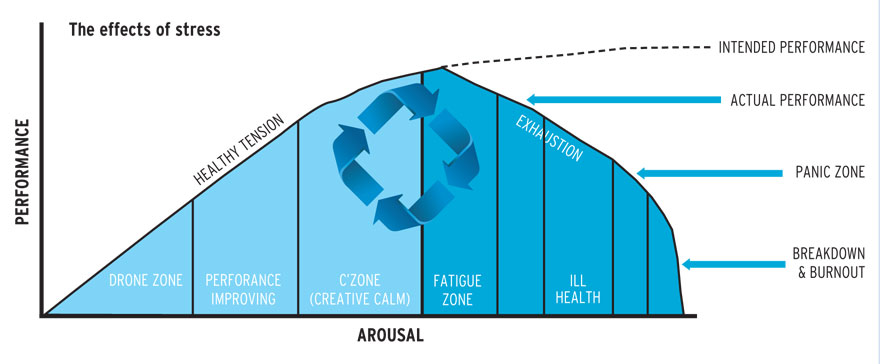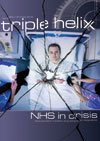Roxana Walker identifies important biblical principles
Stress levels in the NHS are at an alltime high. A survey carried out by the British Medical Association in 2015 found that 68% of responding GPs in England felt that their workload was unmanageable either 'a lot of the time' or 'all the time'. (1) The government is trying to deliver a seven day NHS with already over-stretched resources. Junior doctors have been taking industrial action over the threat of a new contract that they believe has serious implications for patient safety and quality of care.
Consultants are required to spend an increasing number of hours at work rather than being on-call from home. As medical science advances, patient expectations increase and with them the fear of litigation and the cost of indemnity cover. The Care Quality Commission (CQC) has a mandate to inspect every medical facility, which carries with it a host of obligations that have to be fulfilled.
'Stress' may be defined as 'any pressure from the outside world that causes us to feel an inward sense of strain'. (2) Another definition, which can provide a helpful model, is 'the experience of the difference between the perceived demands upon a person and one's perceived ability to meet those demands'. Work demands can take the forms of: increased working hours or patient numbers; covering for absent colleagues; studying for exams; trying to meet the requirements for training, revalidation or CQC; trying to please difficult colleagues or demanding patients; fear of complaints or litigation. Demands can also come from outside of work, such as church commitments, family illness or relationship difficulties.
The issue of perception is important because it brings the role of personality into the picture. A confident person may see a new target as a challenge and take it in their stride, whereas a perfectionist or an anxious person may see it as a burden or a threat. There is also a great variation in terms of activities people find stressful. Some people love the buzz of emergency situations while others find them terrifying; some thrive on listening to people's problems while others find this a draining experience.
The effects of stress
Some degree of stress can be healthy, in that it stimulates and stretches us and prevents us from becoming bored. In 1979, Peter Nixon produced a graph to illustrate the relationship between arousal (or pressure) versus performance. (3) Up to a certain point, increasing pressure produces greater output, but beyond a certain point the pressure becomes too much and a person's achievement starts to decline.
Most healthcare professionals have some degree of resilience and ability to cope with stress, and to a certain point will cope quite well with the demands of their job. But when the tipping point is reached on a sustained basis, a person's health will begin to suffer. Family relationships may suffer if the person is spending excessive hours at work or worrying about work, and marriages may fail or children miss out on quality time with their parents. Church commitments and devotional time can easily be squeezed out, and a Christian can become cynical or lose their love for the Lord and commitment to his kingdom. Some people develop unhealthy coping mechanisms such as drinking to excess, abusing prescription or illicit drugs, over-eating or skipping meals and living on junk food. Others will develop physical symptoms in response to stress, such as irritable bowel syndrome or headaches. Others still will experience insomnia, anxiety and mood changes that could lead to burnout or depression.
'Resilience' has become a buzzword in the NHS, and may be defined as 'the ability to recover from setbacks, adapt well to change, and keep going in the face of adversity'. (4) Some of the secular resources available contain wise and valuable advice. But how can God's Word help us to cope under pressure and navigate the storms of modern day life?

Principles from God's word
Seek wisdom
The book of Proverbs extols the value of wisdom, and James tells us that God will guide us if we ask him for wisdom. (5) One example of God's guidance comes in the form of Jethro, Moses' father-in-law. He observes Moses hard at work, sitting from morning to evening listening to the disputes of the people and deciding the course of action to be taken in each case. After observation, Jethro says to Moses, 'You and these people who come to you will only wear yourselves out. The work is too heavy for you; you cannot handle it alone'. (6) He advised Moses to train and appoint officials to serve as judges, who could arbitrate on most cases themselves and come to Moses only with the most difficult cases where they needed his input. Jethro had concerns for Moses' health and for sustainability, and was also looking at how others may serve and develop their gifts.
As ever, we can also learn from the life of Jesus. He spent much of his time listening to people's needs and healing the sick, but he knew that he also needed time with his Father. He needed to listen for what to do next, for the bigger picture, and this included teaching and spending time with a small group of disciples in order to prepare them for their future commission.
When we are struggling with the demands of our work, we need to seek God and his wisdom. Are there things we could delegate? Are there things that we need to stop doing? Have we taken on too much in our church commitments, and do we need to say 'No' to some requests? Could we re-organise our working day or working week in order to make it less burdensome? Or are there bigger questions which need to be asked, such as whether we should reduce our working hours or whether we are in the right job or specialty?
Remember the Sabbath
'Remember the Sabbath day by keeping it holy. Six days you shall labour and do all your work, but the seventh day is a Sabbath to the LORD your God. On it you shall not do any work... For in six days the LORD made the heavens and the earth, the sea, and all that is in them, but he rested on the seventh day. Therefore the LORD blessed the Sabbath day and made it holy.' (7) Originally the Sabbath referred to Saturday, but Christians now generally regard Sunday as 'The Lord's Day'. In the healthcare professions there are clearly times when we are required to be at work on a Sunday, and this is right and proper for the care of patients. But there are some important principles to observe: God created human life to follow a pattern of work and rest, both on a diurnal and a weekly basis. We are not machines that are able to keep working at full capacity all the time. The Sabbath was created not only to rest from work but also to give our full attention to God. We need to look closely and honestly about how we use our Sundays. Many Christians are so busy with church activities, entertaining and family responsibilities that Sundays are not restful at all. If this is the case, we need either to re-order our Sundays or find some time during the week when we stop and rest, learning to trusting God with our 'to-do' list.
Alongside this, we need to remember the general principles of self-care, and apply to ourselves the advice we give to our patients. This includes getting enough sleep, eating properly, regular exercise, and making time for family, friends and leisure. 'Knowing ourselves' can mean developing an awareness of how we function, what causes us stress and which activities are most likely to refresh and restore us.
Know when to seek help
However wisely we try to live, there will come a time for many of us when we do start to experience the symptoms of burnout, anxiety or depression. It can be very difficult to recognise these symptoms in ourselves, but if this does happen it is essential that we seek medical help. Christian health professionals are not immune to mental ill-health any more than we are immune to physical illness. We should not go into denial or attempt to self-medicate. We should turn to the Lord in our distress, but this does not preclude consulting our GP, and if necessary a counsellor or psychiatrist, and following their advice. It may be necessary to have time off work, and this is essential if our concentration or judgment is affected.
Depression is never easy or pleasant, but often periods of illness are times of learning and growth, so that we may emerge with new insights and wisdom, and with new compassion to help others who are going through times of darkness.
I would like to close with a few words of encouragement from Scripture: 'Praise be to the God and Father of our Lord Jesus Christ, the Father of compassion and the God of all comfort, who comforts us in all our troubles, so that we can comfort those in any trouble with the comfort we ourselves receive from God'. (8)
Roxana Walker is a part-time GP and a volunteer support worker for Nottingham Pregnancy Crisis Centre.
Glossary
Depression is an illness characterised by low mood and a number of other symptoms which may include loss of interest or enjoyment in usual activities, sleep difficulties, increased or decreased appetite, fatigue, poor concentration and low self-esteem.
Burnout is a syndrome of emotional exhaustion, involving the development of low selfesteem, lack of motivation and a loss of concern and feeling for others. There is often an overlap between depression and burnout.
































